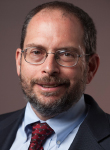Astronomer Jonathan Lunine wins Cassini medal
By Blaine Friedlander

For his exemplary research in planetary science, Cornell astronomy professor Jonathan Lunine will be awarded the prestigious Jean-Dominique Cassini Medal by the European Geosciences Union, the group announced Oct. 13. He will be the medal’s 10th recipient and the first American-born scientist to receive the medal. The ceremony will take place in Vienna, Austria, in April 2015.
“I’m thrilled to receive this medal, and it is quite humbling to join such a distinguished group of scientists who received the award before me,” said Lunine, Cornell’s David C. Duncan Professor in the Physical Sciences and director of the Center for Radiophysics and Space Research. “This is a confirmation of how closely U.S. and European scientists work together.”
Upon hearing the news, Cornell astronomy chair Terry Herter said: “I’m very pleased for Jonathan, as this is a much-deserved honor. For years he has been renowned internationally for his research and his role in the global astronomy community.”
The European Geosciences Union is dedicated to excellence in the geosciences, planetary and space sciences for the benefit of humanity. It was established in the September 2002 merger of the European Geophysical Society and the European Union of Geosciences and is headquartered in Munich, Germany.
The Jean-Dominique Cassini Medal is for scientists who have achieved exceptional international standing in planetary and space sciences for their merit and scientific achievements. It is named for Jean-Dominique Cassini, an Italian-born, 17th-century French astronomer who found the gap between Saturn’s rings – now called the Cassini Division – and discovered four of Saturn’s moons.
Lunine’s work spans planetary science, theoretical astrophysics and astrobiology. He is interested in how planets form and evolve, what processes maintain and establish habitability, and what kinds of exotic environments, such as methane lakes, might host chemistry sophisticated enough to be called “life.” He pursues these interests through theoretical modeling and participation in spacecraft missions.
Media Contact
Get Cornell news delivered right to your inbox.
Subscribe